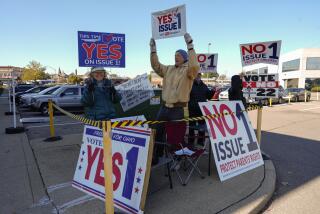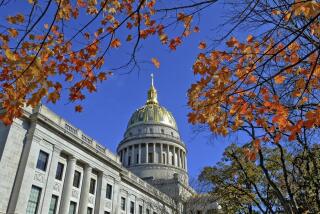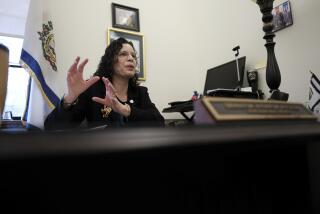Soaring healthcare costs drove West Virginia teachers to go on their (possibly illegal) statewide strike
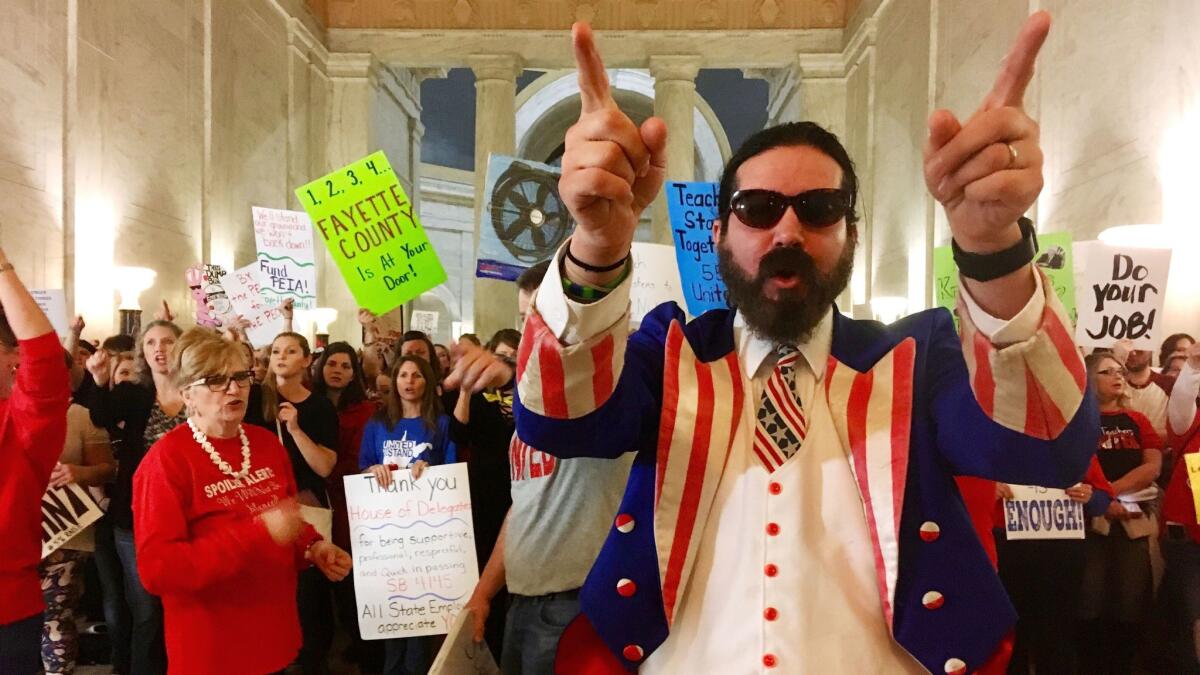
- Share via
The Wetzel County public school district in West Virginia has given some pretty strange explanations for why every school in the state has been closed for more than a week.
“All schools in Wetzel County will be closed on Wed. Feb. 28, 2018, due to the stars beginning to align,” the district announced, cryptically, on the state department of education’s website.
The district added an update Friday: “Lets just say it has nothing to do with weather.”
Funny. But no explanation was needed. Everybody in West Virginia knows what’s going on.
For seven straight school days, a massive teachers strike has gripped every county in West Virginia, with teachers setting up picket lines on public roads and thronging the capitol to holler at state lawmakers.
And with lawmakers unable to reach a deal on a compensation package Friday, the strike is likely to extend into next week, raising the stakes on all sides to resolve an unpredictable work stoppage that leaves thousands of children at home each day.
“I call it the ‘West Virginia Spring.’ Spring is here in West Virginia,” said Democratic state Sen. John Unger, comparing the protests to the Arab Spring protests of 2011. “This is truly a citizens’ movement,” not led by lawmakers or labor leaders, Unger added. “We’re not leading it. What we’re doing is we’re going along with it.”
The teachers, as public employees, technically have no right to strike in West Virginia, according to state Supreme Court precedent, and the state’s attorney general has called the walkouts “unlawful.”
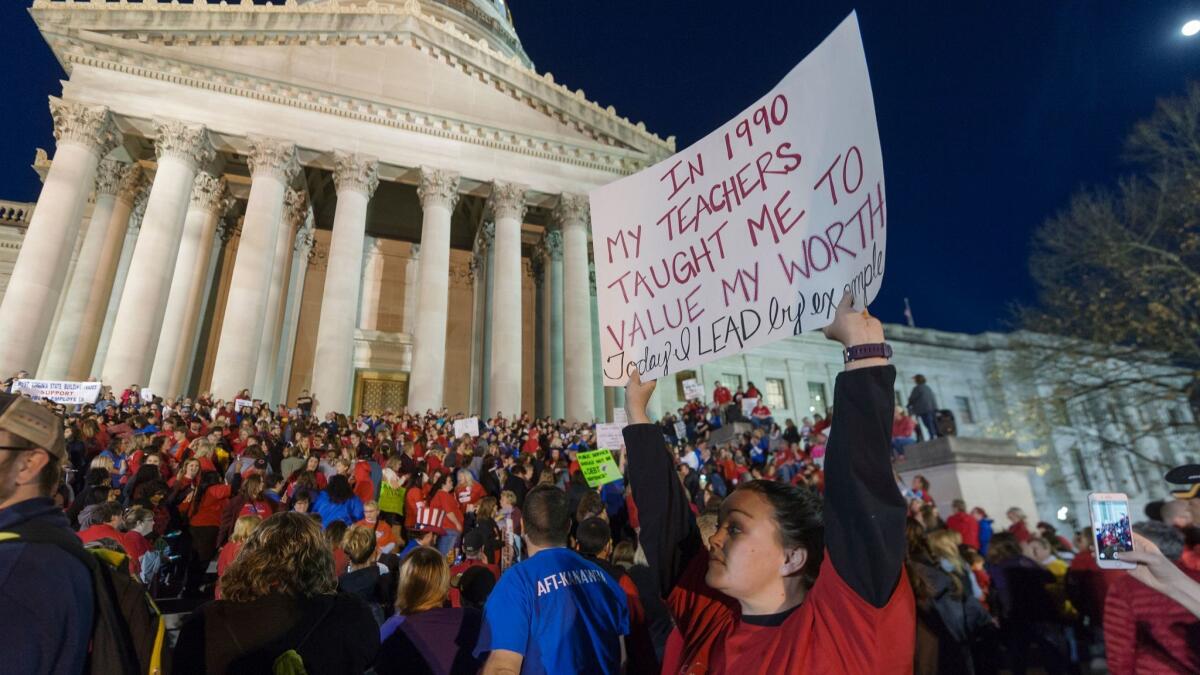
But the educators said they have been driven to the brink by low pay that has left many educators seeking second jobs or other careers, or other states, entirely.
The militancy of the rank-and-file has surprised state lawmakers and even the teachers’ own union leaders, who went behind closed doors earlier this week to strike a deal to raise pay by 5% — only to see teachers reject the deal and vote to continue their walkouts.
At the heart of the matter, teachers say, isn’t their salaries. It’s their soaring healthcare costs.
“We’ve seen [people say] ‘teachers are not happy with the 5% increase’ — that’s not it at all,” said Mary Clark, 49, a fifth-grade teacher in Monongalia County. “That’s not what kept us out. It’s the insurance. That’s the big deal.”
In West Virginia, teachers and other state employees receive health coverage through the Public Employees Insurance Agency.
The state program is funded 80% by employers and 20% by employees. That means as healthcare costs continue to rise significantly, the program’s long-term solvency requires “significant revenue increases in employer and employee premiums” over the next five years, according to an October 2017 financial report prepared for PEIA.
In other words, employees are going to need to pay up. “They are wanting to raise our rates,” Clark said.
But there’s a problem with that: After teaching for a little more than 10 years, “I’ve not seen [my take-home pay] go up any at all,” not even counting inflation, Clark said. If her healthcare costs increase, “that’s not feasible.”
Daniel Summers, 35, a high school business and English teacher in Monongalia County, laid out the problem many teachers face: He has two young children who require child care, he said, and, “We’re looking at some of our premiums potentially doubling next year.”
Summers, who has a master’s degree and other education credits, normally qualifies for raises of about $600 to $700 a year, he said. But he’s now looking at his insurance increasing by about $300 — per month.
“While having a $700 increase sounds lovely, that would only cover about a month and a half of my PEIA insurance, and we’re still talking about wages that I’m bringing in, with student debt, and a master’s degree, below $45,000 year,” Summers said.
Summers has already taken a second job as an education coordinator for the county. Including his wife’s wages, the couple qualifies for government assistance programs including the Women, Infants and Children (WIC) food program.
Having a master’s degree and living in a more prosperous county mean that “I am one of the absolute lucky ones” compared to other teachers in the state, said Summers, a West Virginia native. But he said the state was offering little incentive to stay and “that scares me, because I love this state, and I want to work in this state.”
Republican Gov. Jim Justice signed an executive order Wednesday establishing a task force to study PEIA’s funding.
The state’s House of Representatives passed the pay-raise bill, but the bill has stalled in the Republican-controlled Senate, whose leaders have said they don’t want to move as rapidly as the House.
“They have their opinions on quickly moving on items that haven’t been substantiated, that’s their view, that’s their reaction,” said state Sen. Mitch Carmichael, the Republican president of the chamber, according to the Charleston Gazette-Mail. “The Senate will take a much more thoughtful, deliberate approach. Our objective is to ensure the long-term stability and viability of our PEIA insurance program.”
It’s unclear if state leaders will try to take legal action to end the teacher’s strike, as they did in 1990 when the previous teachers strike led to a state Supreme Court ruling against the teachers.
Since teachers’ salaries are dictated by the Legislature, that “obviously gives the Legislature the upper hand,” said Joshua E. Weishart, an associate professor of law and policy at West Virginia University. “The only way really for teachers to negotiate is through the public forum, by expressing themselves through the strike.”
But Weishart said the teachers might be able to argue that the state’s conditions for them have violated constitutional mandates for an adequate education for children. In terms of making lawmakers look harder at education funding, “I think the strike has already succeeded,” Weishart said.
Anna Simmons, 26, an elementary school counselor in Monongalia County, said she quit her union, the American Federation of Teachers, in disappointment in 2016 because it endorsed Justice for governor. (Justice, then running as a Democrat, has since switched parties.) But she said the walkout has inspired her to rejoin her union.
“I’m grateful to be here, to be a part of this. … I truly, wholeheartedly feel that this is hope again for West Virginia,” said Simmons, who once thought about leaving West Virginia for other opportunities, but decided to stay because she wanted to make a difference in her home state.
“It gets emotional for us, because West Virginia is deep, history runs deep, and strikes are not unknown to our working people here,” Simmons said. “People died on the lines fighting for what they believe in.”
And so on Friday, she was out with her fellow picketers.
Matt Pearce is a national reporter for The Times. Follow him on Twitter at @mattdpearce.
More to Read
Sign up for Essential California
The most important California stories and recommendations in your inbox every morning.
You may occasionally receive promotional content from the Los Angeles Times.
